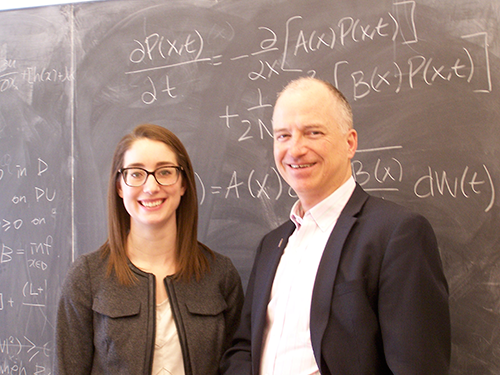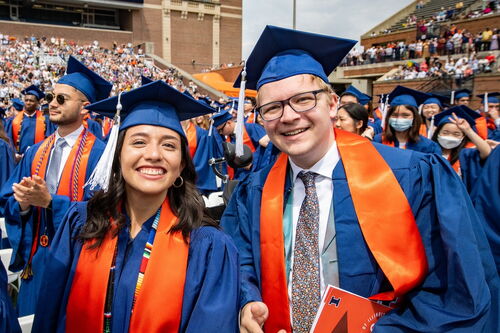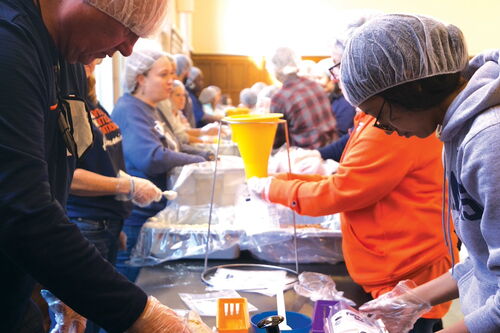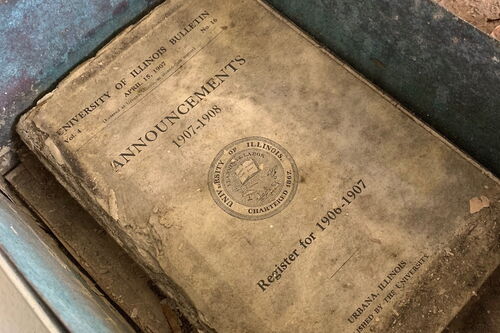New possibilities for math

Thanks to a new, successful and widely recognized internship program, exciting opportunities that allow graduate students in the Department of Mathematics to use their skills for real-life applications are becoming easier to find—and they’re not limited to academia.
The Program for Interdisciplinary and Industrial Internships at Illinois—PI4 for short—is a training program funded by the National Science Foundation for graduate students in mathematics looking to apply their education to real-world tasks. Since the program’s launch in 2014, the number of graduate students in mathematics who’ve landed an internship preparing them for their career has grown dramatically.
“A lot of (graduate students) come here and they’re great at math, but they realize they don’t want to be professors,” said Richard Laugesen, director of graduate studies in mathematics and PI4 program leader. “In the past, they might have stuck around to be a professor because they didn’t know what else to do. Well, much better they go to industry or a lab to be a full-time researcher if they like the kind of cut and thrust of seeing results on a day-to-day basis. You won’t find that in academia.”
Such was the case for mathematics graduate student Meghan Galiardi, who recently saw an internship arranged by PI4 lead to a full-time position. When she graduates in May, Galiardi will work in the complex systems division of Sandia National Laboratories, a federally funded research and development center that carries out various government and industrial contracts for the U.S. Department of Energy’s National Nuclear Security Administration. PI4 funded Galiardi’s trips to Albuquerque, New Mexico to intern at Sandia for the past two summers, and she maintains a research assistantship with them while she finishes her thesis work at Illinois.
Galiardi said she had never even heard of Sandia before being connected through PI4 and is currently working on a project dealing with power grid resilience, which is something she had no previous experience with. Galiardi has noticed that more of her peers are becoming more open to industry jobs—even in fields completely foreign to them—because of the opportunities PI4 can provide.
“A lot of graduate students in a math department don’t even get exposed to that,” Galiardi said. “They don’t necessarily even know the opportunities that are out there. That’s been a big benefit of PI4. From a younger age, it gets grad students thinking about things they can do.”
Numbers reflect the program’s success. In 2013, six graduate students in mathematics obtained on-the-job internships. In 2014, the year PI4 launched, 17 graduate students locked down internships. That number rose to 27 in 2015, with nearly half of the internships arranged through PI4.
The growth in internships can be attributed to PI4’s creativeness in terms of where it places its graduate students—often in fields that mathematics students would never have expected themselves to work in. Students have been exposed to a full spectrum of possibilities, including agricultural modeling with companies such as Caterpillar or John Deere, and cryptography for the Department of Defense. One PI4 grad student spent a summer analyzing millions of Twitter data for a text analytics startup company, Idibon, while another carried out data analysis for Akuna Capital, a trading firm in Chicago.
The efforts of PI4 have been widely recognized within the math and sciences community. In a 2015 workshop report done by the NSF and Institute for Pure and Applied Mathematics, PI4 was featured as a successful model for internship programs. It also directly inspired certain aspects of the NSF’s new grant program, “Enriched Doctoral Training in the Mathematical Sciences,” Laugesen said.
PI4 is divided into three main training components. The first is PI4-Prepare, which includes on-campus mini-courses for incoming graduate students new to interdisciplinary and industrial mathematics. This includes a two-week long computational mathematics boot camp, an intensive, hands-on introduction to computation for solving mathematical problems in science and engineering that aims to improve participants’ skills in mathematical coding.
Secondly, PI4-Train involves on-campus mini-courses and research working groups that prepare members to apply mathematics to real world problems. The final and possibly most crucial component is PI4-Intern, which provides a bridge from the work done within the department to internships in scientific labs, national labs or industry.
Laugesen said PI4 continues to prove there is no single career path mathematics majors must follow.
“I can guarantee none of our students come here thinking they might contribute to agricultural models, for instance,” Laugesen said. “That’s part of what’s exciting about it. This is transformational. It just changes the atmosphere, it changes the students’ expectations, it changes their behaviors.”
Laugesen explained PI4 has created a sort of cultural change within the department that has grad students collaborating and sharing ideas more than ever. According to Galiardi, more students are beginning to realize the kind of differences they can make with their mathematical expertise.
“Being a math student for so many years, you’re used to sitting here and working on math by yourself,” Galiardi said. “You don’t really think of the ways you can go out and use your math in other places. PI4 makes those connections.”








